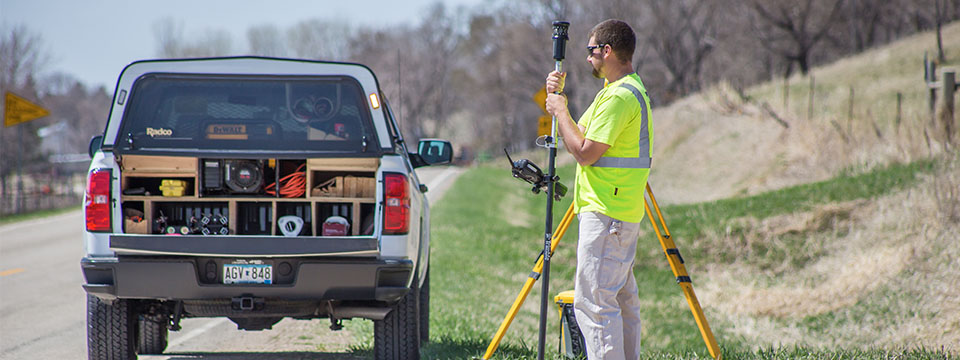Five Myths of Land Surveying (and the Truth Behind the Legends)

Spring has finally sprung in the Upper Midwest, and as the daffodils are popping up everywhere, so, too, are the yellow-vested land survey crews. You see them in the fields, along the roadside, and on city sidewalks peering intently at their equipment, and if you’ve ever had to know your property’s boundaries, split a lot, define your land prior to a sale or purchase, or had a dispute with a neighbor over a fence line, you may have an idea what that crew is doing out there. Still, there are plenty of misconceptions about the science and art of defining and illustrating a property’s boundaries and, sometimes, the buildings and natural features it contains. We’ve put together a few of the most common myths and asked our surveyors to debunk them.
MYTH #1
“I’m not sure, but I think my neighbor may have moved the property pin.”
REALITY
It’s possible, but our crews rarely come across such a situation. A more likely explanation is that someone may have accidentally knocked out a lath (a thin, wood stake) or pulled up a fiberglass stick—markers we set next to property corners to make them more visible. The corner itself, though, typically remains untouched.
MYTH #2
Sections of land are 5,280 feet square.
REALITY
The Public Land Survey System (PLSS) was laid out by the Government Land Office in the late 1800s and early 1900s for the Upper Midwest. Based on their notes, which we still use today, hardly any sections of land (if any at all) measure 5,280 feet square. The east-west section line distances can vary considerably within a particular township. (In land surveying, a township comprises 36 sections.) Sections along the north and west township lines are “correction” sections and can vary by many hundreds of feet, depending on location.
MYTH #3
If you’re headed out to plow the “back forty,” you’ll be plowing 40 acres.
REALITY
An extension of the previous myth, a “forty” is often called out to describe a quarter quarter (or 1/16) of a section. Rarely does a “forty” measure an exact 40 acres, though.
MYTH #4
The person that pays for the survey usually gets more land out of it.
REALITY
All licensed land surveyors have a duty to be impartial and to protect the public. Each state has a governing board that oversees professional licensure, and surveyors are held by these boards to a high, ethical standard. Surveyors use evidence recovered in the field together with extensive research to make their final boundary determinations, without prejudice as to who is paying for the survey.
MYTH #5
“Who needs a surveyor? The County’s Geographic Information System (GIS) pages show where my boundary lines are.”
REALITY
While county GIS web pages are an outstanding tool to see a representation of your boundary lines, they are, in fact, just an estimation. The boundary lines are drawn using aerial photos and other approximations to delineate boundaries. We have seen many instances where not only are the boundaries drawn in the wrong locations, but sometimes they do not reflect the actual property as described in the recorded deed. While a great starting point, GIS pages should be used with caution (as noted in the many disclaimers found on these websites).
The profession of land surveying has a long and storied past, full of characters ranging from poets (Henry David Thoreau) to United States presidents (George Washington, Thomas Jefferson, and Abraham Lincoln). It takes a hardy person to work in the field under less-than-ideal conditions at times, exposed to weather, wildlife, and, sometimes, unhappy neighbors. Yet it is a noble profession, ensuring property owners’ rights and investments are protected and that communities can set guidelines for the benefit of the greater community.
Contributors include:
Bryan Balcome, LS | 320-335-5023
SW and West Central Minnesota
Garrett Borowicz, LS | 218-277-7421
NW Minnesota
Juergen Brunkhorst, LS, CH | 320-335-5045
SW and West Central Minnesota and hydrographic surveys throughout Minnesota
Chad Conner, LS, CFedS | 218-316-3632
Central, North and NE Minnesota and Tribal Lands throughout Minnesota
Kelly Jordan, LS, Professional Arborist | 651-358-2343
Metro Area and NE Minnesota
Chris Jordheim, PLS | 701-765-8006
North Dakota
Peter Oetliker, LS | 507-206-2132
SE and East Central Minnesota

Search Archives
Categories
Posts by Topic
- Staff News (98)
- Architecture (66)
- Funding (61)
- Civil Engineering (53)
- Education (48)
- Architectural Design (38)
- Engineering (37)
- Land Surveying (32)
- Surveying (26)
- Environmental (22)
- Commercial (21)
- Interior Design (18)
- Streets & Highways (17)
- Utilities (17)
- Water Resources Engineering (14)
- Industrial (13)
- Community (11)
- Cultural (11)
- Landscape Architecture (11)
- Sports & Recreation (11)
- Government (10)
- Aerial Mapping (8)
- Mechanical Engineering (8)
- GIS (7)
- Electrical Engineering (6)
- Structural Engineering (6)
- Senior Living (5)
- Transportation Engineering (5)
- Bridges (3)
- Site Design (3)
- Transmission & Distribution (3)
- Healthcare (2)
- Planning (2)
- manufacturing (1)
Recent Posts
-
May 06, 2024




